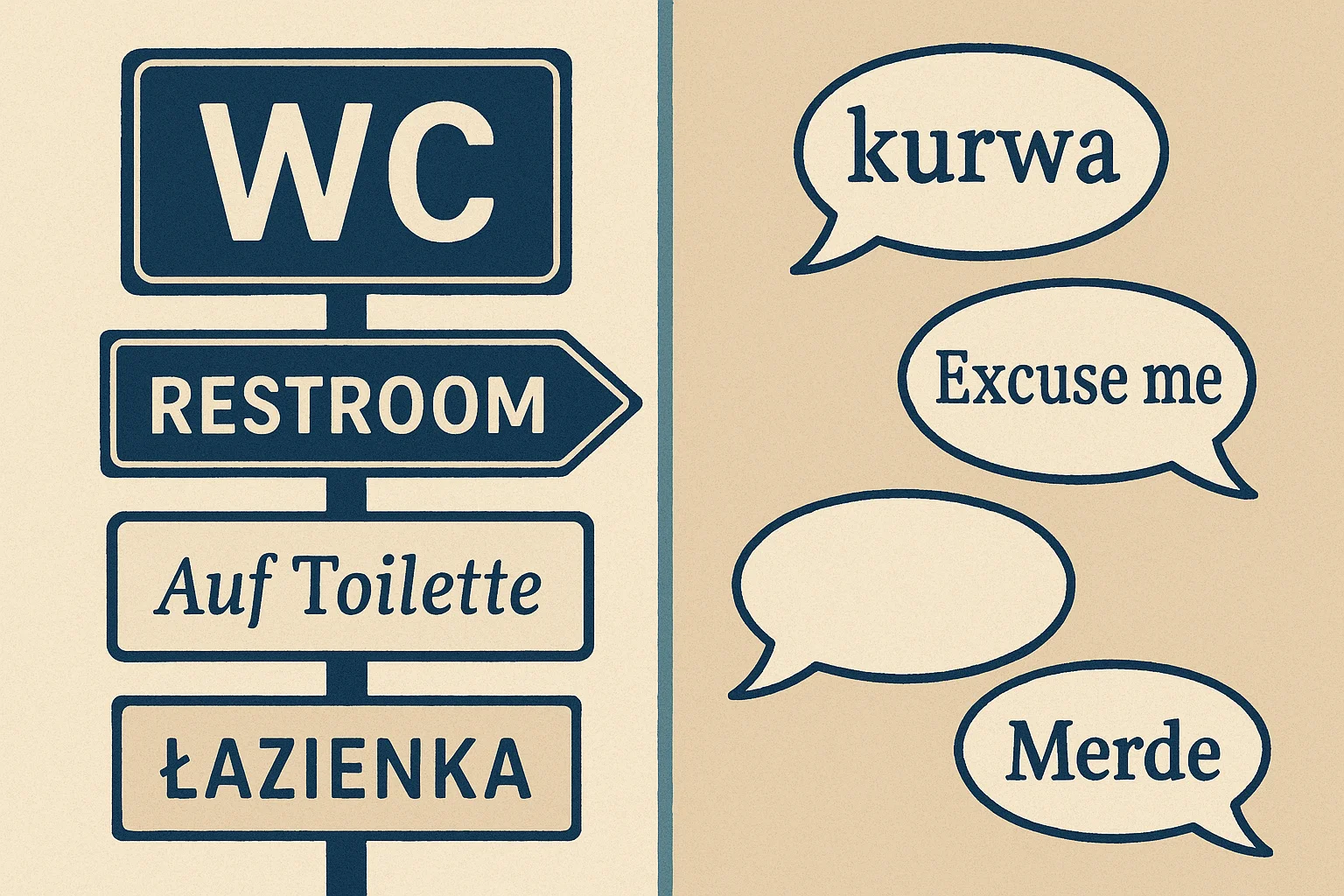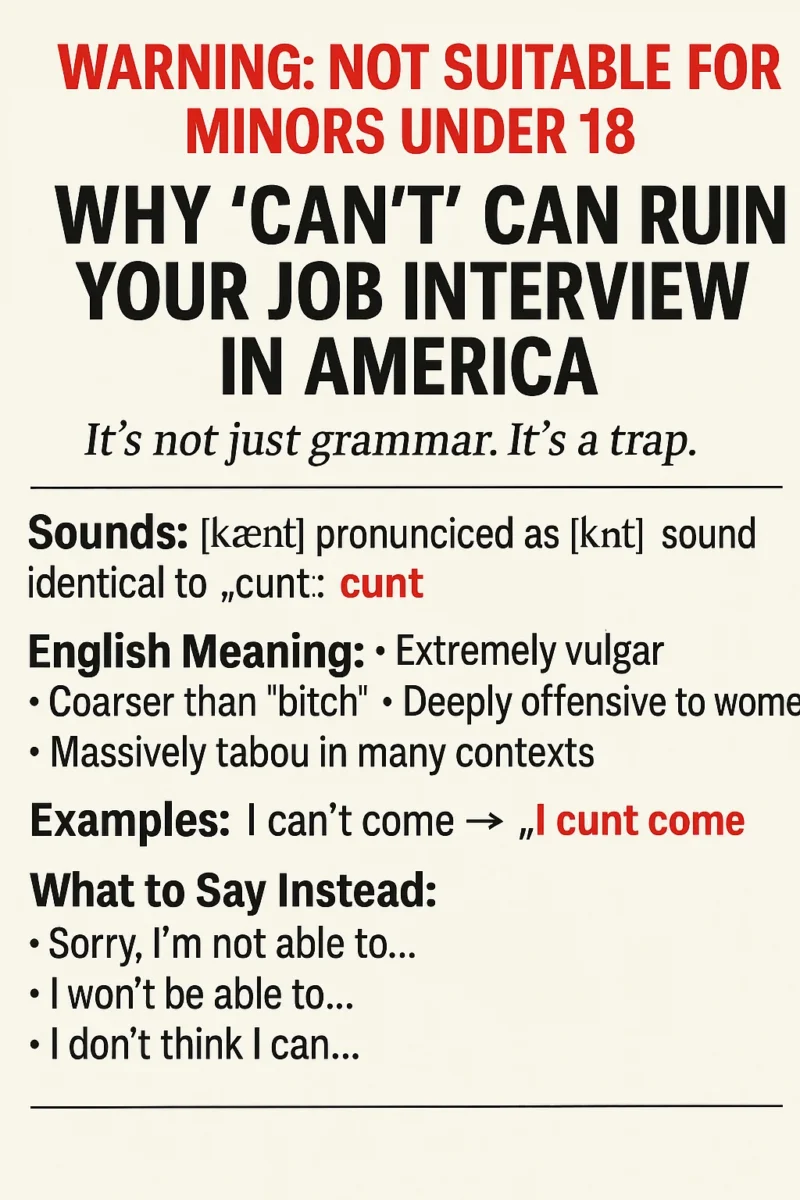It’s not just grammar. It’s a linguistic landmine.
⚠️ ADVERTENCIA: NO APTO PARA MENORES DE 18 AÑOS
⚠️ ESTE ARTÍCULO CONTIENE LENGUAJE EXPLÍCITO Y REFERENCIAS CULTURALES.
Se recomienda discreción al lector.
Aviso de finalidad educativa:
This article includes offensive and culturally sensitive language examples used strictly for educational purposes only.
It is intended for adults (18+) who are learning languages for real-life application and cultural survival.
El contenido puede no ser apropiado para lectores o alumnos más jóvenes. Se recomienda encarecidamente la discreción de los padres.
- Iniciar la Escuela de Idiomas por Tymur Levitin
When a Small Sound Makes a Big Problem
Imagine saying something completely innocent like:
“I can’t do it today.”
But instead of hearing your polite refusal, the interviewer hears:
“I cunt do it today.”
Now you’ve just dropped one of the most offensive words in the English language — the word “cunt”, which translates directly as пизда in Russian.
And no, this is not just a swear word. In American English, it’s possibly the worst word you could say out loud — especially in a professional setting.
Why Is This So Dangerous?
Because the two words — "no puedo" y “cunt” — are almost identical phonetically, especially when pronounced carelessly or without a strong /t/ sound.
| Palabra | IPA | Danger Level |
|---|---|---|
| can’t | /kænt/ | ✔️ Safe (if clear) |
| cunt | /kʌnt/ | ❌ Extremely offensive |
In fast speech, many non-native speakers skip the “t” or shorten the vowel:
“I can’t” → /kæn/ → /kʌn/ → /kʌnt/
Even native speakers sometimes mishear this — and when coming from someone with an accent, it can be interpreted as aggressive, vulgar, or even sexual.
What Does “Cunt” Really Mean?
Let’s be clear:
In British English, it may be used among friends (still harsh).
In Australian slang, it may even mean something like “dude”.
But in American English — it’s a loaded insult with deep misogynistic y sexual connotations.
Equivalent to saying:
“You dirty bitch.”
“You worthless whore.”
“Пошла нахуй, сука.” — depending on tone and situation.
You do no want to accidentally say that — not in an interview, not in a meeting, not ever.
Real Example from a Real Student
One of our students once said during an interview in New York:
“I’m sorry, I cunt do it before Monday.”
The interviewer paused. The meeting ended early. She never got a reply.
Later, during a lesson, we played back her audio — and even she was shocked.
Her intention: “I can’t.”
What she said: “I cunt.”
How to Say It Correctly
To avoid disaster:
- Emphasize the vowel: /kænt/, not /kʌnt/
- Always pronounce the final /t/ — even clearly say: “can-not” if needed
- Slow down when saying “can’t” — clarity over speed
- If unsure, use an alternative expression (see below)
Safer Alternatives to Use
| Safer Expression | Use Case |
|---|---|
| I’m afraid I won’t be able to… | Formal refusals |
| Unfortunately, I can’t… | Polite negative |
| I’m not available… | Scheduling |
| It won’t work for me | Conflict |
| I’d prefer not to… | Gentle refusal |
You lose nothing — and avoid a linguistic disaster.
Why Other Teachers Won’t Tell You This
Because it’s “too sensitive.”
Because it’s “inappropriate.”
Because they teach language like it’s a museum piece, not a living, risky, real-world tool.
We don’t.
En Escuela de idiomas Levitin y Iniciar la Escuela de Idiomas por Tymur Levitin, we train our students not just to speak — but to survive linguistically.
Our teachers are traductores profesionales, trained to decode context, risk, and nuance.
We don’t sell fantasies. We teach the real thing.
Our Job Is Not to Decorate You with Language — But to Defend You With It
This is not about perfection.
Se trata de not making fatal mistakes.
It’s about avoiding embarrassment, misunderstanding, and even danger — just because of a vowel.
En otras escuelas, aprenderás a hablar.
Con nosotros aprenderás a no quemarte.
Ready to Learn the Language That Respects and Protects?
Únete a nosotros:
🌐 https://levitinlanguageschool.com
🌐 https://languagelearnings.com
Autor: Tymur Levitin
Fundador, Director y Director de la Escuela de Idiomas Levitin
Columna del autor: Lengua, supervivencia y verdad
© Tymur Levitin. Todos los derechos reservados.
Contactos y canales
Telegrama (Noticias): https://t.me/start_school_tymur
Telegrama (Comunidades de Aprendizaje):
- https://t.me/START_SPRACHENSCHULE_TYMUR
- https://t.me/START_LANGUAGE_SCHOOL_TYMUR
Facebook:
- Global: https://www.facebook.com/@timurlevitin
- Canadá/Israel: https://www.facebook.com/englishdeutschtimurlevitin
- ESTADOS UNIDOS: https://www.facebook.com/profile.php?id=61560395143684
Instagram:
- https://www.instagram.com/timurlevitin/
- https://www.instagram.com/tymur_levitin_/
Grupo de Facebook: https://www.facebook.com/groups/728240905385457
Blogger: https://timurlevitin.blogspot.com/
LinkedIn (Escuela): https://www.linkedin.com/company/start-language-schoolby-tymur-levitin/
























